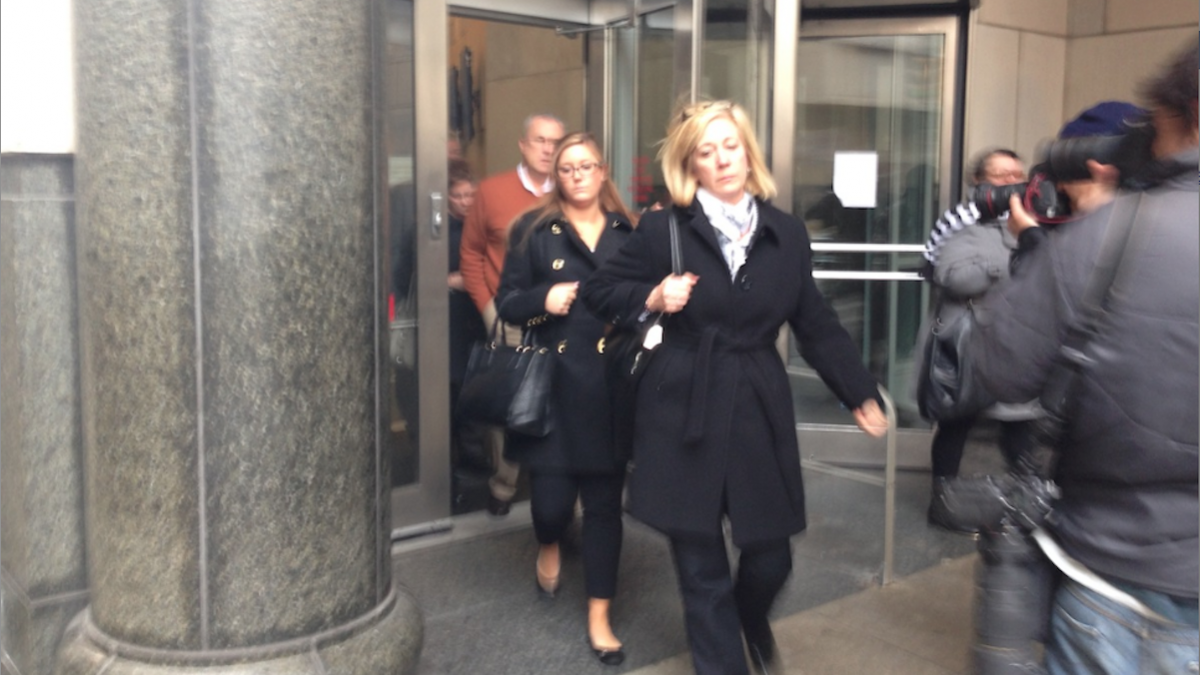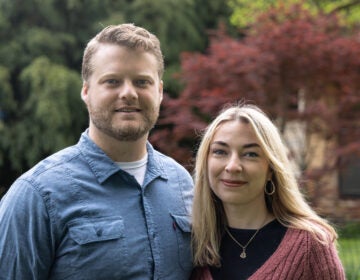In Center City beating case, anti-gay tweets from defendant become evidence
Listen
Kathryn Knott (center), leaves the courthouse in December 2014. (Brian Hickey/WHYY)
Future defendants, beware: Send your tweets carefully, because they could be used against you in a criminal trial.
That was one of the lessons gleaned at a court hearing Tuesday on the violent beating of a gay couple in Center City last September.
Two men were walking from a frozen yogurt shop around Rittenhouse Square, police said, when Kevin Harrigan, walking with nearly a dozen others, hurled anti-gay slurs at the couple. The exchange escalated into an attack that left one man with a broken jaw, that was wired shut for weeks.
In October, Harrigan of Warrington and another defendant, Philip Williams of Warminster, pleaded guilty to conspiracy and aggravated assault. Both were given probation sentences, with mandatory community service.
But the third defendant, Kathryn Knott, 25, the daughter of a police officer, rejected a deal. The Southampton resident is now fighting the charges.
The hearing weeks ahead of the start of her trial was centered mostly on a fight over tweets. A key question was which tweets highlight Knott’s character traits, and which ones are just irrelevant?
State prosecutors argued that dozens of tweets Knott made years before the attack establish that she has an anti-gay bias.
“We never ask to admit evidence that we don’t think is relevant or admissible. This is the type of thing that is discretionary, it’s up to the court to let it in or not. I respect the court’s discretion,’ said Assistant District Attorney Michael Barry. “Not everything is black or white. It’s somewhere in the middle,” he said.
He pushed for several sets of tweets to be admitted as evidence. Some indicate excessive drinking; others show possible racial prejudices, and still other tweets, according to prosecutors, demonstrate that Knott harbored anti-gay sentiments well before the beating.
But Knott’s defense attorney, Louis Busico, said the state’s goal is to smear his client.
“I mean, is there anybody out there who could dissect each and every one of their postings and tweets from four, five, fix years ago and be asked to explain it?” Buscio said after the hearing.
Ultimately, Judge Roxanne Covington said any tweets that could be interpreted as homophobic should be admitted. That’s relevant, she said. But the rest? Covington said they were too far removed from the allegations in the case.
But some of the new evidence sheds little light on defendant’s character or motivation.
For instance, one of the tweets now part of the official court record is from 2010: “Jazz flute is for little fairy boys.”
It’s a line from the movie “Anchorman” and, now, official evidence against Knott.
She will stand trial next month on two counts of aggravated assault, conspiracy and several other charges.
Buscio maintains that she “touched no one” during the attack, though “she may have pointed a finger,” he said after the Tuesday hearing.
That flies in the face of prosecutors’ account, which says a witness saw Knott throw punches at the two men.
WHYY is your source for fact-based, in-depth journalism and information. As a nonprofit organization, we rely on financial support from readers like you. Please give today.




